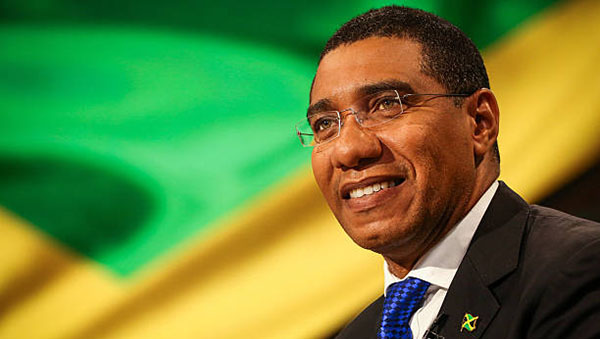GEORGETOWN, Guyana, December 29, 2018 (CMC) – Chairman of the Caribbean Community (CARICOM) grouping, Andrew Holness, on Friday, said the 15-member regional integration movement has had an eventful year, both regionally and internationally.
“We have seen advances in the CARICOM Single Market and Economy (CSME), the signing of the new Multi-Lateral Air Services Agreement, and we have been invited to participate in meetings of major international partners,” Holness, the Jamaica head of government, said in an end of year message.
He said that a proper functioning CSME — which allows for the free movement of goods, skills, labour and services across the region — is essential to deliver the goals of the Revised Treaty of Chaguaramas to the people of the Caribbean, for the growth and development of regional economies.
Holness added that recognising this fact, regional leaders renewed their focus on this initiative in 2018, given the need to accelerate its implementation and that there has been progress.
He said the St. Ann’s Declaration, issued after the special summit, held in Trinidad and Tobago, earlier this month, “outlines the resolve that we have to move this process forward and to maintain the momentum that had been triggered from the 39th Regular Meeting of the Conference of CARICOM Heads of Government in Montego Bay, last July.
“The whole-of-society approach to driving the implementation of the measures is underlined by our agreement to have a formalised, structured mechanism, to facilitate dialogue between the Councils of the Community and social partners, particularly private sector and labour,” he stated.
Prime Minister Holness said that the importance of the private sector to spur growth and development in the region, has been further recognised by the agreement to take all necessary steps to allow for mutual recognition of companies, incorporated in a CARICOM member state.
“The trimming of the red tape, within our domestic space, can provide greater opportunity for intra-Community investment and cross-border fertilisation with our private sector,” he said, adding, that in order to diversify the range of skills, available under the free movement regime, regional leaders decided that agricultural workers and security guards, with a Caribbean Vocational Qualification or equivalent, will be added to the agreed categories of skilled nationals, who will be entitled to move, freely, and seek employment within the Community.
“We also agreed that beauty service practitioners and barbers will also be permitted to so move and work. These are significant additions that will help to debunk the myth that free movement of skilled personnel caters only for the elite. It will be important for Heads to deliver on these commitments.”
The CARICOM chairman said that to encourage greater use of the free movement regime, the leaders adopted the Protocol on Contingent Rights, which will cover the rights of persons moving to another country, as well as their spouses and dependents.
“This is another historic step for our integration process, taken at Montego Bay, the cradle of modern regional unity. It will give comfort to those wishing to utilise the free movement of skills provisions, but have been reluctant to move without the assurance of their families being able to access services in their adopted country. Ten countries have so far signed the Protocol.”
He said that CARICOM has also been making significant strides on the socio-economic front, with the report of the Regional Commission on Marijuana being presented to heads of government.
“We have noted the Commission’s findings, conclusions and recommendations, in particular with respect to human and religious rights; the social and developmental impact of use among adolescents; the economic benefits to be derived and issues related to its classification. We, therefore, have an analytical platform from the excellent work of the Commission, for whatever further action we wish to take, with respect to marijuana.”
Holness told the regional population that in 2018, he and the President of Haiti, Jovenel Moise, represented CARICOM at the G7 Meeting in Ottawa, Canada, while he also represented the region at the BRICS Summit in South Africa and the G20 Summit in Argentina.
Jamaica also represented the Community at all the G20 sectoral meetings throughout the year of the Argentine Presidency, and Holness said that these invitations demonstrate the esteem in which the Community is held globally, being seen as a leader among small States.
He said the visit of the Cuban President, Miguel Diaz-Canel, to Jamaica to attend the CARICOM summit in July, that came just three months after his assumption of office, “emphasised the special relationship which our Community and Cuba have shared, over the last 46 years.
Holness said that the strong relations with Chile were also underlined by the visit of President Sebastian Pinera to meet with CARICOM leaders.
“There is no doubt that this is a Community on the move. A Community that is determined to provide opportunities for all its citizens to maximise their potential and so enhance our prospects for sustainable growth and development.
“This is a Community, which continues to be recognised globally as a leader, whether in the battle against chronic non-communicable diseases, against the negative effects of climate change or within the framework of Small Island and low-lying coastal Developing States,” Holness said, adding “we have a lot to be proud of and a lot more to accomplish. Let us remain resolute in the face of all challenges”.
 Pride News Canada's Leader In African Canadian & Caribbean News, Views & Lifestyle
Pride News Canada's Leader In African Canadian & Caribbean News, Views & Lifestyle





